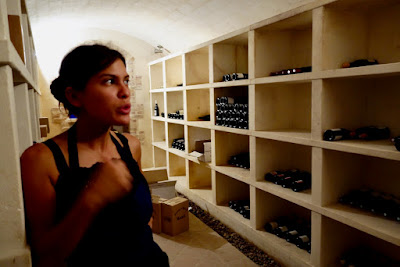The renown of Paris 20ème-arrondissement bistrot Le Baratin has a firm basis in the indisputable finesse of chef Raquel Carena's cuisine and the marksman-like natural wine instincts of her partner Philippe Pinoteau. Oft-overlooked amid the accolades surrounding the restaurateur couple is their savvy in human resources. Decades of hiring staff dedicated to natural wine - if not deriving directly from winemaking families, as in the case of front-of-house alums Inès Métras and Thibault Pfifferling - has helped the restaurant's influence expand far beyond Paris.
This summer, the southern Rhône village of Tavel saw the opening of La Courtille, a seasonal restaurant by two other talented Le Baratin alumnae, server-chef Natalia Crozon, and chef Marie Lézouret. Housed in the courtyard of an historic building formerly dedicated to silkworm production, La Courtille offers a menu that, in Crozon's own telling, is kind of another Le Baratin.
Bravo to that, my friends and I responded, over lunch back in July. Who wouldn't be overjoyed to find an homage to Carena's rustic preparations of veal kidney and beef cheeks transposed to a spacious sunlit courtyard provisioned with an unending supply of natural and organic Tavel rosé ?
Crozon and Lézouret met at Le Baratin; it's also where Crozon met her boyfriend, Domaine de l'Anglore's Thibault Pfifferling, whose family have helped support the new restaurant. Lézouret is thus able to avail herself of vegetables from the Pfifferlings' garden plot in the town center.
For now the wine list is composed of Domaine de l'Anglore's sought-after wines, amply supplemented by neighboring organic estates like Domaine Lafond-Roc Epine and the Château de Manissy. But Crozon hopes eventually to fill the restaurant's immense cellar with vintages from natural winemaker friends throughout France and beyond.
 |
| The restaurant's interior, little-used in summertime. |
The menu, naturally, evokes the pair's former workplace, which is to say that Lézouret, like her mentor, wisely avoids culinary fads and fussy preparations, instead highlighting fresh, summery country-cooking. A mild mediterranean accent arrives in the form of tarama with red cabbage, or a salad of octopus and chickpeas.
Balancing the lightly exotic appetizers was a humble main course of veal kidney, bulbous and savory.
Over lunch with Thibault Pfifferling that day we enjoyed two of his family's new négoçiant cuvées, deriving from opposite ends of the Gard. I'm particularly fond of "Les Salines," a direct-press carignan from the Costières de Nimes, about which, perhaps, more later in a separate post about the visit chez Pfifferling. For now it suffices to say that "Les Salines" slakes a thirst for Pfifferling-style vinification of direct-press rosé that has remained unquenched since the family discontinued their glowy direct-press rosé "Chemin de la Brune" a few years back.
La Courtille's courtyard is far larger than I had expected. The isolation of each table permits a pleasant sensation of semi-private dining. Serving plates is practically a long-distance sport. Crozon, meanwhile, evinces the same radiant charm familiar to anyone who encountered her at Le Baratin, having seemingly adapted effortlessly to the mixed clientele of a tiny village in the south of France. Her hospitality, like Lézouret's menu, is refined without being imposingly so.
In the wake of the 2016 US election, along with, probably, much of my generation, I began to reflect upon the grave cultural divergence between that nation's comparatively educated coastal capitals and the rest of fly-over America, where conditions of raging incoherent tribal idiocy apparently prevail. The causes are, of course, innumerable, but if there is a prominent symptom to be cured, it is perhaps a lack of cultural exchange. Progressive people my age seem to cluster in New York for a while before eventually moving to LA or San Francisco, in a migratory pattern as predictable as it is enclosed. I am tempted to think that for progressive, thoughtful people, the most patriotic act possible would be to relocate to the many marginal towns and cities not already overrun with co-working spaces, art galleries, "third wave" coffee shops, natural wine bars, cold-pressed juice bars, vegan locavore restaurants, and so on, in the hope of effecting some overdue cultural exchange.
The same dynamic applies, somewhat less urgently, to restaurants in France. My neighborhood in Paris has like nineteen natural wine bars and four specialty organic greengrocers. In Tavel, just twenty minutes' drive from the urban center of Avignon, there was until this summer no place to go for well-sourced, well-executed cuisine and natural wine. Crozon and Lézouret intend to keep the restaurant open throughout the harvest and fermentation period, closing in October until next season. I daresay they'll be missed all winter long.
208 Chemin des Cravailleux
30126 TAVEL
Tel: 04 66 82 37 19
Open for lunch Monday - Friday; open for dinner Monday - Saturday.
Closed Sundays.
Related Links
My recent account of the 2018 edition of Couleur Tavel, the village's annual wine festival














No comments:
Post a Comment